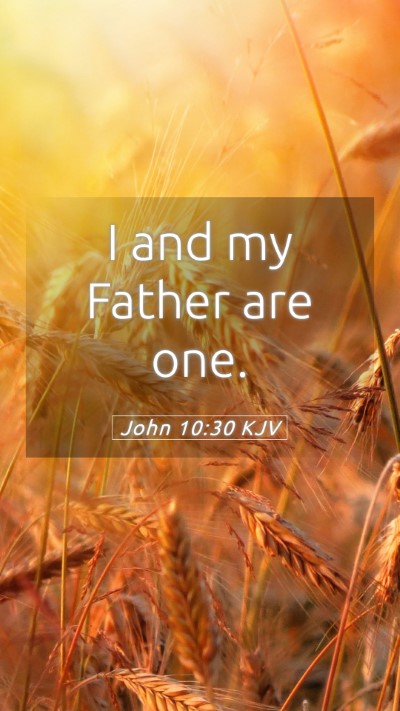Understanding John 10:30
In John 10:30, Jesus declares, "I and my Father are one." This profound statement encapsulates the unity and divine nature of the relationship between Jesus and God the Father. It holds significant implications for our understanding of the Trinity and the identity of Christ within Christian doctrine.
Bible Verse Meanings
This verse serves as a cornerstone for debates about the divinity of Christ. Throughout the history of biblical interpretation, theologians have grappled with what it means for Jesus to claim oneness with the Father. The assertion is not merely philosophical but is rooted deeply in the personhood of God and the redemptive work of Jesus.
Commentary Insights
-
Matthew Henry:
Henry emphasizes this verse as a proclamation of the essential unity between the Father and the Son. He argues that this verse underscores the divinity of Christ, asserting that His will, purpose, and essence are perfectly aligned with that of the Father.
-
Albert Barnes:
Barnes elaborates on the interpretation that the "oneness" mentioned in this verse pertains both to essence and purpose. He supports the view that Jesus is asserting His equality with God, as seen in His authority over life, judgment, and salvation.
-
Adam Clarke:
Clarke draws attention to the response of the Jewish leaders who understood this claim as blasphemy. He reflects on the historical context of this confrontation, suggesting that the assertion of oneness with God speaks to Jesus’ messianic identity.
Bible Verse Interpretations
The interpretation of John 10:30 extends beyond a theological statement. It invites readers to reflect on the nature of God and the role of Jesus as the mediator between humanity and the Divine. This verse becomes a lens through which we can understand Jesus’ mission and authority as rooted in His divine identity.
Understanding Scripture
Understanding this verse requires not only a theological approach but also an exploration of the cultural and historical context in which it was spoken. The strong reactions from the religious leaders highlight the radical nature of Jesus’ claims and the implications they had for Jewish beliefs at the time.
Application of John 10:30
This verse speaks to modern-day believers about the nature of their relationship with God through Christ. Understanding that Jesus and the Father are one can inspire deeper faith and a more profound sense of belonging in the Christian community.
Related Bible Cross References
- John 1:1: "In the beginning was the Word, and the Word was with God, and the Word was God."
- Philippians 2:6-7: "Who, being in very nature God, did not consider equality with God something to be used to his own advantage."
- Colossians 2:9: "For in Christ all the fullness of the Deity lives in bodily form."
Conclusion
In concluding our analysis of John 10:30, we see that this single verse holds layers of meaning that enrich our understanding of Jesus’ divinity and His relationship with the Father. As believers engage with this Scripture, they are invited to deepen their faith and knowledge of Christ’s nature as they explore its implications for their lives and their understanding of God.


